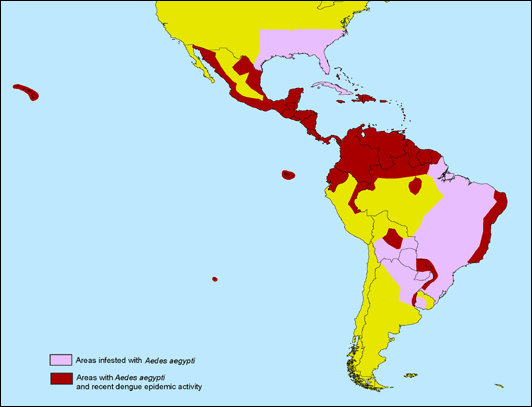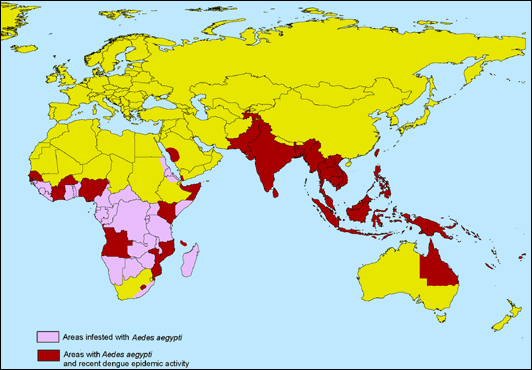Dengue (DF) and dengue hemorrhagic fever (DHF) are caused by one of four closely related, but antigenically distinct, virus serotypes (DEN-1, DEN-2, DEN-3, and DEN-4), of the genus Flavivirus. Infection with one of these serotypes provides immunity to only that serotype for life, so persons living in a dengue-endemic area can have more than one dengue infection during their lifetime. DF and DHF are primarily diseases of tropical and sub tropical areas, and the four different dengue serotypes are maintained in a cycle that involves humans and the Aedes mosquito. However, Aedes aegypti, a domestic, day-biting mosquito that prefers to feed on humans, is the most common Aedes species. Infections produce a spectrum of clinical illness ranging from a nonspecific viral syndrome to severe and fatal hemorrhagic disease. Important risk factors for DHF include the strain of the infecting virus, as well as the age, and especially the prior dengue infection history of the patient.
Clinical Diagnosis
Classic dengue fever or "break bone fever" is characterized by acute onset of high fever, 3-14 days after the bite of an infected mosquito. Patients develop frontal headache, retro-orbital pain, myalgias, arthralgias, nausea, vomiting, and often a maculopapular rash. Many patients notice a change in taste sensation. Acute symptoms, when present, usually last about 1 week, but weakness, malaise, and anorexia may persist for several weeks. A high proportion of infections produce no or minimal symptoms, especially in children. Treatment emphasizes relief of symptoms, avoiding aspirin and other non steroidal anti-inflamatory medications and encouraging oral fluid intake (see Treatment below).
Treatment
Even for outpatients, the need for maintaining adequate hydration should be stressed. In addition, monitoring for signs of hemorrhagic fever and early appropriate treatment are key to ensure survival if the patient progresses to a more severe form of dengue infection. DHF/DSS can be effectively managed by intravenous fluid replacement therapy, and if diagnosed early, fatality rates can be kept below 1%. It is very important that physicians and other health care providers learn to recognize this disease.
To manage the pain and fever, patients suspected of having a dengue infection should be given acetaminophen preparations. Aspirin and non-steroidal anti-inflammatory medications may aggravate the bleeding tendency associated with some dengue infections and in children can be associated with the development of Reyes syndrome.
For more info: visit the CDC
The Beaver

My guest map is wonderful ! And you'd all be wonderful to post, all of you lurk mode readers!
Thanks and may the winds of Fate blow your way !



5 comments:
OMG!!! that sounds just hideous! good to know you are back home and hope you get better real soon! Bonne guérison Beav'.
¡AAAAH!
Chica, suena horrible... I DO hope you're fine!
Cuídate muuuucho, eh?
Besines!
I am doing the secret Mexican healing dance for you right now.
It probably doesn't work, but it does make people laugh. And as they say, laughter is the best medicine.
Heal quickly...
are you feeling any better? we miss you in the blogosphere! :)
Pauvre castor! When I lived in Bangkok, we lived in the constant threat of catching it. Those damn mosquitoes, such a useless breed! I really hope you feel better by now, it may take a while before you are fully on your feet again, but you will feel better soon. My neighbor in Bangkok got it, he was quite weak for a month or so and then finally starting jumping all over the place again shortly after.
Remets-toi vite!
Ciao
Post a Comment